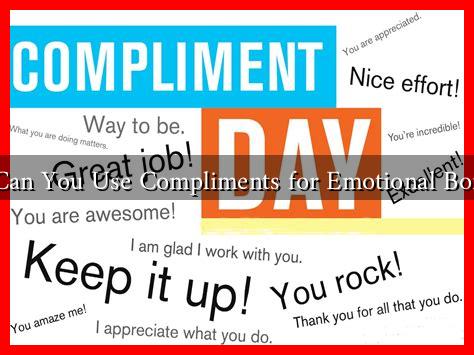-
Table of Contents
- How Can You Use Compliments for Emotional Bonding?
- The Psychology Behind Compliments
- Types of Compliments That Foster Emotional Bonding
- How to Deliver Compliments Effectively
- Case Studies: The Impact of Compliments in Relationships
- Statistics on the Power of Compliments
- Conclusion: The Lasting Impact of Compliments
How Can You Use Compliments for Emotional Bonding?
Compliments are more than just kind words; they are powerful tools for building emotional connections. When used effectively, compliments can enhance relationships, foster trust, and create a sense of belonging. This article explores how to use compliments strategically to strengthen emotional bonds with others.
The Psychology Behind Compliments
Understanding the psychological impact of compliments is crucial for leveraging them effectively. Compliments can trigger the release of dopamine, a neurotransmitter associated with pleasure and reward. This biochemical reaction not only makes the recipient feel good but also reinforces positive behavior and strengthens interpersonal connections.
Types of Compliments That Foster Emotional Bonding
Not all compliments are created equal. Here are some types that can significantly enhance emotional bonding:
- Specific Compliments: Instead of saying, “You did a great job,” specify what was great about it. For example, “Your presentation was incredibly engaging, especially the way you explained the complex data.” This shows that you are paying attention.
- Genuine Compliments: Authenticity is key. Compliments that come from a place of sincerity are more impactful. For instance, “I admire your dedication to your work; it inspires me to be better.” This fosters trust and respect.
- Compliments on Effort: Acknowledging someone’s hard work can be more meaningful than praising the outcome. For example, “I appreciate how much effort you put into this project; it really shows.” This encourages a growth mindset.
How to Deliver Compliments Effectively
Delivering compliments is an art that requires practice. Here are some tips to ensure your compliments resonate:
- Be Timely: Deliver compliments soon after the action or behavior you are praising. This immediacy reinforces the positive behavior.
- Use Body Language: Non-verbal cues such as eye contact, a warm smile, or an open posture can enhance the impact of your words.
- Personalize Your Compliments: Tailor your compliments to the individual’s personality and preferences. This shows that you value them as a unique person.
Case Studies: The Impact of Compliments in Relationships
Research supports the idea that compliments can significantly improve relationships. A study published in the journal *Personal Relationships* found that couples who regularly express appreciation for each other report higher levels of satisfaction and emotional intimacy. For instance, a couple who made it a habit to compliment each other daily reported feeling more connected and understood.
Another case study involving workplace dynamics revealed that teams with a culture of appreciation and regular compliments had 31% lower turnover rates. Employees felt valued and were more likely to engage in collaborative efforts, leading to increased productivity and morale.
Statistics on the Power of Compliments
Statistics further illustrate the importance of compliments in emotional bonding:
- According to a survey by *Psychology Today*, 70% of people feel more motivated when they receive compliments.
- A study from the *Harvard Business Review* found that employees who receive regular praise are 20% more productive.
- Research from *Gallup* indicates that employees who feel appreciated are 63% more likely to stay with their employer.
Conclusion: The Lasting Impact of Compliments
In conclusion, compliments are a simple yet powerful way to foster emotional bonding. By understanding the psychology behind compliments, using specific and genuine praise, and delivering them effectively, you can strengthen your relationships both personally and professionally. The evidence is clear: compliments not only make people feel good but also create lasting connections that enhance trust, collaboration, and overall satisfaction. So, the next time you think something nice about someone, don’t hold back—share it! Your words could make a significant difference in their day and your relationship.
For more insights on building emotional connections, consider exploring resources from Psychology Today.


